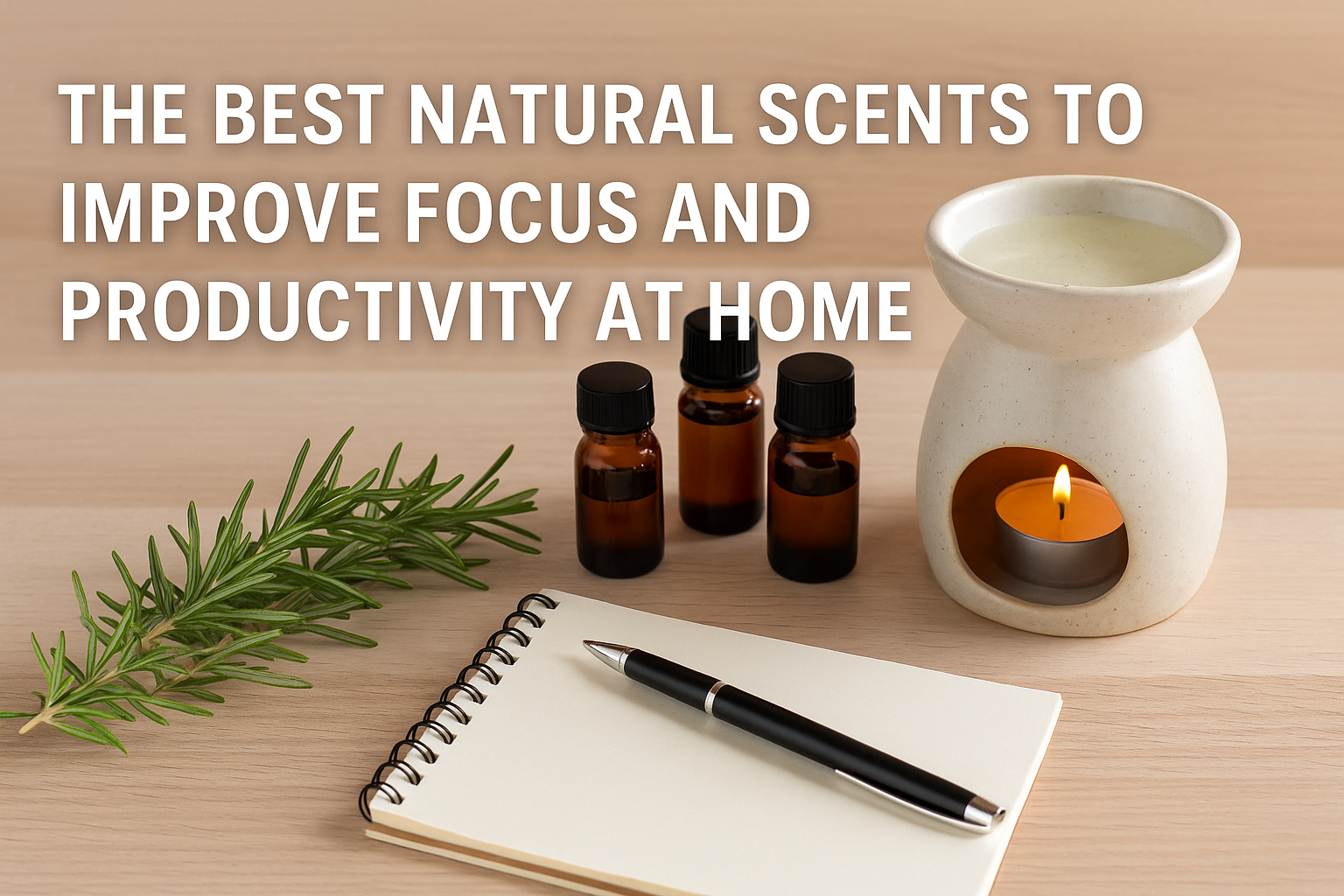Working or studying at home can be challenging. Distractions pile up—social media, family noise, endless tasks—and focus often slips away.
Many people turn to coffee or energy drinks for concentration, but these can cause jitters or crashes. A gentler and more sustainable solution is the use of natural scents.
Fragrance is more than a pleasant background. Certain aromas stimulate memory, sharpen concentration, and even improve problem-solving skills.
By filling your home with the right natural scents, you can transform your environment into a space that supports productivity.
This guide explores the science of how scents affect the brain, the best herbs and oils for focus, DIY blends, and routines for using them effectively.
Why scents influence focus
The olfactory system is directly linked to the limbic system, which regulates memory, emotions, and learning. When you inhale certain aromas, they activate brain regions that boost alertness or calm distractions. For example, rosemary is known to enhance memory recall, while citrus aromas improve mood and motivation.
Benefits of using natural scents for productivity
They sharpen memory and recall, especially during study sessions. They reduce mental fatigue and help sustain energy throughout the day.
They improve mood, which indirectly boosts productivity. They avoid synthetic perfumes and chemical sprays that may irritate or distract. They reconnect daily routines with natural and cultural practices.
Key scents for focus and productivity
Rosemary
Proven in studies to improve memory and attention.
Lemon
Bright and energizing, cuts through mental fog.
Peppermint
Refreshing, reduces fatigue and boosts alertness.
Orange
Uplifting and motivating, reduces stress during work.
Sage
Grounding and clarifying, especially in cluttered spaces.
Marcela
Soothing while still keeping the mind steady.
Basil
Stimulates creativity and flow.
Methods for using natural scents
Diffusers
Add 6–8 drops of oil to water in an electric diffuser. Use during study or work sessions.
Room sprays
Mix 200 ml water, 1 tsp alcohol, and 15 drops of chosen oils. Spray in the workspace before beginning tasks.
Candles
Soy wax candles infused with rosemary, lemon, or basil provide steady fragrance during work hours.
Herbal simmer pots
Boil water with citrus peels and rosemary for hours of gentle aroma.
Sachets
Place dried rosemary or mint sachets near your desk.
Inhalers
Small personal tubes with cotton soaked in essential oils for focus on the go.
DIY blends for focus
Memory Boost Blend
- 4 drops rosemary
- 3 drops lemon
- 2 drops peppermint
Creative Flow Blend
- 4 drops orange
- 3 drops basil
- 2 drops lavender
Calm Focus Blend
- 4 drops marcela
- 3 drops sage
- 2 drops lemon
Energizing Work Blend
- 4 drops peppermint
- 3 drops orange
- 2 drops rosemary
Seasonal scent strategies
Spring
Use lemon and rosemary to clear away sluggishness.
Summer
Peppermint and lime to stay cool and alert.
Autumn
Orange and sage to maintain balance during busier schedules.
Winter
Marcela and rosemary to sustain calm focus indoors.
Creating a daily productivity routine
Morning
Diffuse rosemary and lemon while preparing for the day.
Midday
Spray peppermint-orange mist to recharge energy.
Afternoon
Simmer sage and citrus for steady concentration.
Evening
Switch to calming blends like marcela and lavender if tasks continue late.
Cultural connections to focus scents
Rosemary sprigs were used by students in ancient Greece to improve memory. Citrus peels were simmered in Gaúcho kitchens to freshen and energize after meals. Sage bundles have been burned for centuries to cleanse and clarify spaces. Using these scents today revives cultural traditions that valued mental clarity and focus.
Mistakes to avoid
Do not overload oils; too much can be overwhelming. Do not use only stimulating oils late at night, as they may disturb sleep. Do not expect scents alone to replace good habits—pair them with routines like breaks and hydration.
Frequently Asked Questions
Do natural scents really improve memory?
Yes. Studies show rosemary and peppermint can improve recall and alertness.
Can I mix different oils?
Yes, blending often creates balanced effects. Use citrus for mood and rosemary for focus together.
How long should I diffuse scents?
Thirty to forty minutes is enough. Prolonged use may overstimulate.
Are these safe for children?
Yes, but use gentle oils like orange or lavender in lower amounts. Avoid peppermint for children under 6.
Can I use these scents for long study sessions?
Yes, rotate blends to maintain effectiveness and avoid sensory fatigue.
Do dried herbs work as well as oils?
They are gentler but still effective when simmered or placed in sachets.
Will scents replace coffee?
They won’t replace caffeine but help sustain alertness naturally without crashes.
How do I know which scent works best for me?
Experiment with different blends. Pay attention to which aromas make you feel energized, calm, or motivated.
Conclusion
Natural scents are powerful allies for focus and productivity. With rosemary, lemon, peppermint, sage, marcela, orange, and basil, you can design blends that sharpen memory, sustain energy, and reduce stress.
Whether diffused, simmered, or sprayed, these aromas transform any home workspace into a center of clarity.
By adopting natural scent rituals, you do more than freshen the air—you create conditions for deep work, creative flow, and balanced energy.

Marcela Cardozo is passionate about Southern Brazilian traditions and the cultural stories carried through natural scents. She blends knowledge of native herbs, essential oils, and regional rituals to create practical and inspiring content. Her writing connects ancestral wisdom with modern living, offering readers simple ways to bring authenticity, well-being, and meaning into their everyday lives.
